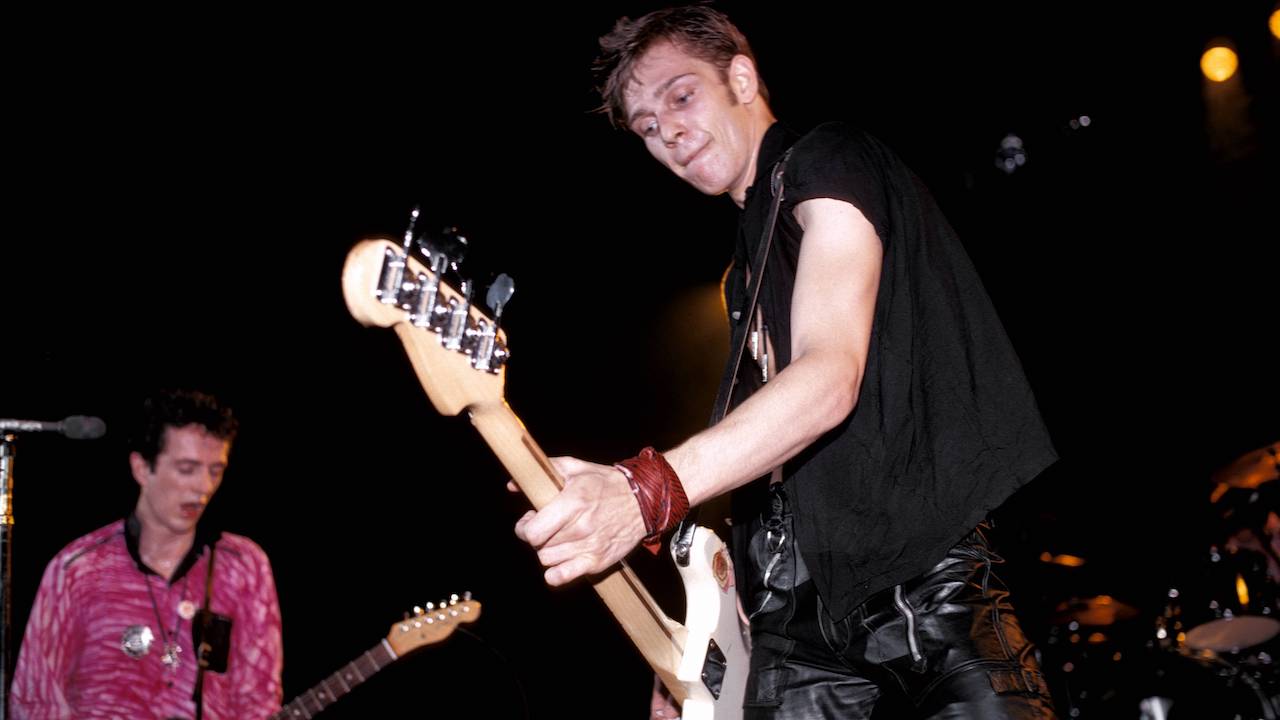
Former bass player for The Clash, Paul Simonon, has been talking about his new project with singer-songwriter Galen Ayers and looking back over some of his bass playing highlights.
Talking to the Rockonteurs podcast, hosted by bass player Guy Pratt and his bandmate in Saucerful of Secrets, former Spandau Ballet guitarist Gary Kemp, Simonon was promoting his new collaboration with singer-songwriter Galen Ayers, daughter of Ken Ayers, under the name Galen & Paul. Their debut album, Can We Do Tomorrow Another Day?, is released in May, with the single Lonely Town out now.
But predictably the conversation looked back over his bass playing for The Clash, Gorillaz and The Good, The Bad & The Queen, starting with the musical influence Simon brought to The Clash as someone brought up amid the reggae sounds of Jamaican communities in London.
“I grew up in Brixton and Ladbroke Grove so it was quite a strong vibe,” said Simonon. “It really helped a lot, insofar as [trying] to practice bass by playing along with The Who I could hardly hear the bass. It was so guitar and drums-orientated, really, sound-wise. Whereas reggae, I just put the record on and play along to it and work out the lines.”
“It’s much deeper,” agrees Pratt. “John Entwistle was always playing up the neck. There's no bass in it, basically.”
The basslines of ska, reggae and dub, meanwhile, were all about groove. “Each bassline in Jamaican music, to me anyway, was a bit like how you move your feet,” says Simonon. “It's like how you dance to it.”
To begin with, though, Simonon couldn’t play a note. “Mick [Jones, guitarist and songwriter] showed me everything, to be honest. And what made it easier, I actually painted the notes on the neck of the bass, so if Mick shouted in the middle of a song, 'A!', I'd go to A, 'B!' I'd go to B, ‘Octave, Mick?’”
All the latest guitar news, interviews, lessons, reviews, deals and more, direct to your inbox!
Eventually he contributed songs like The Guns Of Brixton, a song that later had its bassline sampled by Norman Cook on Beats International’s Dub Be Good To Me, a UK number 1 hit in 1990. He struggled to write songs, says Simonon, comparing writing lyrics to “squeezing a pebble – it's not easy.” The Guns of Brixton was an exception: “I just had the bassline and in rehearsals I used to play that and they play along to it. And eventually I sat down and put some words to it.”
Famously Norman Watt-Roy of Ian Dury & the Blockheads played the funky bassline on the band’s 1981 single The Magnificent Seven while Simonon was off making a film, Ladies and Gentlemen, The Fabulous Stains. How did he about someone else doing the bass parts?
“I thought it was quite a smart move, really,” says Simonon. “And in some ways, when you think about the Gorillaz, Damon Albarn's collaboration with Jamie [Hewlett], what's interesting is that they're always having different musicians involved. So it's not a set sound. It goes in all different directions. And anyway, I was sort of in Vancouver, being involved in a film, so I couldn't be there. They were in New York and Norman was around and they got Norman in, which was brilliant. The only thing is, when you're playing live, you have to play that bassline…”
Guy Pratt sympathizes: “I've depped for Norman with the Blockheads, so I've had to play Hit Me With Your Rhythm Stick with no rehearsal. I mean…”
“Norman's amazing,” says Simonon.
In 2007, Simonon teamed up with Blur/Gorillaz man Damon Albarn, guitarist Simon Tong of The Verve, and Afrobeat drumming legend Tony Allen, a fearsome job for any bass player. Despite some challenges, Simonon says, “at one point, Tony said, ‘Paul: there's a lot of people that think they're playing bass. And they're not. But you are’."
Elsewhere in the podcast, Simonon recalls the London Calling cover shot moment when he smashed his Fender Precision bass, his legendary fight with Stranglers bassist JJ Burnell (which he remembers quite differently from JJ's version) plus how they made up years later, and Guy Pratt throws in an unusual bass time-keeping story about Simonon. Pratt says that he was at the Groucho Club in London, where he’d tested his fledgling stand-up show and afterwards bumped into Simonon in the bar.
“For some reason I said, ‘Oh, guess what: as a good luck charm I was wearing John Entwistle's watch’,” says Pratt. “I had John Entwistle's old watch. And you went, ‘Oh, if you've got one bass player's watch, you should have another’ and you took off this watch and gave it to me. I still have it to this day.”
Listen to the full interview on the Rockonteurs podcast. Galen & Paul’s debut album, Can We Do Tomorrow Another Day? is out in May.
Tom Poak has written for the Hull Daily Mail, Esquire, The Big Issue, Total Guitar, Classic Rock, Metal Hammer and more. In a writing career that has spanned decades, he has interviewed Brian May, Brian Cant, and cadged a light off Brian Molko. He has stood on a glacier with Thunder, in a forest by a fjord with Ozzy and Slash, and on the roof of the Houses of Parliament with Thin Lizzy's Scott Gorham (until some nice men with guns came and told them to get down). He has drank with Shane MacGowan, mortally offended Lightning Seed Ian Broudie and been asked if he was homeless by Echo & The Bunnymen’s Ian McCulloch.
